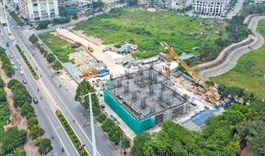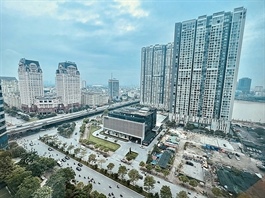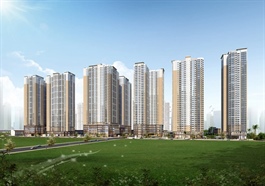Strict process puts off real estate access
Strict process puts off real estate access
Vietnam’s banking sector is grappling with the challenges of stringent loan procedures and market imbalances, impacting the growth and accessibility of the real estate market.

In Vietnamese real estate, businesses are facing significant legal and procedural hurdles, with over 70 per cent of the challenges rooted in legal complexities, according to Nguyen Quoc Hiep, chairman of GP.Invest.
“The major impediment for companies stems from protracted legal procedures, notably in land clearance, deterring both domestic businesses and foreign investors,” Hiep stated at a conference last week on the issue.
He proposed that commercial banks should expedite the loan assessment process to a one-month timeframe, from the current 2-3 months, and simplify the extensive documentation required. “Many banks are reluctant to finance significant expenses like land clearance, which is a major burden for companies,” he added.
At the event, Vinhomes chairman Pham Thieu Hoa highlighted difficulties in securing low-interest loans, especially for existing debts.
“Commercial banks’ credit restrictions and a preference for higher interest rates are creating a challenging environment for real estate firms,” he said.
Pham Nhu Anh, CEO of MB, acknowledged the intricate relationship between the real estate market’s legal challenges and banking risks.
“In a risk-prone industry like ours, thorough vetting of loan applications is imperative, which naturally extends processing times,” Anh explained. “In times of heightened market risks, it is unrealistic for banks to relax lending standards. We’re focused on collaborating with businesses to address these challenges, without any tightening of real estate lending policies. In fact, we’ve increased loans for individual property buyers.”
CEO of Vietcombank, Nguyen Thanh Tung, also disclosed that real estate loans currently make up nearly a quarter of Vietcombank’s total outstanding loans. He highlighted critical issues plaguing the market, including the scarcity of social housing projects and stringent eligibility criteria for potential buyers.
“The imbalance in the real estate market is evident, with a lack of affordable housing options aligning with the average income of citizens,” he said.
Addressing the topic of elevated lending rates at some banks, Tung explained the underlying factors. “Lending rates are influenced by the individual financial capabilities of banks. High-risk banks, in particular, face elevated funding costs due to their substantial provisions, which in turn leads to higher lending rates,” he added.
Nguyen Duc Vinh, CEO of VPBank, attributed the real estate sector’s current difficulties to a mix of external economic crises and internal policy issues. “The real estate market is grappling with challenges arising from liquidity crises and stringent state policies, hampering project progress,” he said.
Vinh proposed that the State Bank of Vietnam (SBV) extend certain regulatory reliefs to aid banks and real estate businesses. He also suggested reviewing risk coefficients for real estate loans, currently at 200 per cent, and reevaluating the eligibility criteria for the 2 per cent interest support package.
“The real estate sector, if considered pivotal, should not be seen in a negative light. Adjusting the risk coefficients could be a practical solution, positively impacting the market image,” Vinh proposed.
On interest rates, Vinh acknowledged that interest rates are inherently determined by market dynamics, and it is unrealistic to expect the government to intervene with preferential rates. Vinh reiterated VPBank’s commitment to supporting the real estate sector, particularly focusing on viable projects.
“We are fully prepared to fund substantial projects, particularly those in industrial real estate and housing. Notably, projects from Novaland, pending legal compliance, will receive immediate financing from us,” he said.
Simultaneously, Nguyen Thi Hong, Governor of the SBV, highlighted a significant issue plaguing the market: a profound supply-demand imbalance.
“Detailed reports from the SBV and the Ministry of Construction have revealed a disproportionate focus on high and mid-range property segments, while affordable housing for the low-income demographic remains scarce,” she stated.
Hong also noted the urgency for more projects offering apartments below the VND25 million ($1,054) per square metre mark.
“To achieve a sustainable real estate market, we must expand the availability of affordable housing,” she added. “In addition, a significant portion of housing demand is going unmet, as many workers, facing financial hardship, find themselves ineligible for loans. This situation calls for innovative policy solutions.”
“The key to reviving investment lies in ensuring legal transparency and clarity in project developments, particularly regarding pricing. A market perceived as fair and transparent will naturally encourage investment,” Hong said.

























